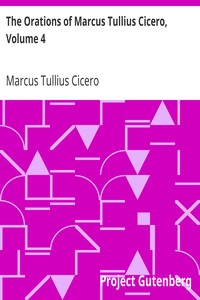Downloads & Free Reading Options - Results
M. Tullii Ciceronis Scripta Quae Manserunt Omnia%2c Recogn. R. Klotz. 5 Pt. [in 11. Pt. 2 And Pt ... by Marcus Tullius Cicero
Read "M. Tullii Ciceronis Scripta Quae Manserunt Omnia%2c Recogn. R. Klotz. 5 Pt. [in 11. Pt. 2 And Pt ..." by Marcus Tullius Cicero through these free online access and download options.
Books Results
Source: LibriVox
LibriVox Search Results
Available audio books for downloads from LibriVox
1Philippics
By Marcus Tullius Cicero

A philippic is a fiery, damning speech delivered to condemn a particular political actor. The term originates with Demosthenes, who delivered an attack on Philip II of Macedon in the 4th century BCE.</br></br>Cicero consciously modeled his own attacks on Mark Antony, in 44 BC and 43 BC, on Demosthenes's speeches, and if the correspondence between M. Brutus and Cicero are genuine [ad Brut. ii 3.4, ii 4.2], at least the fifth and seventh speeches were referred to as the Philippics in Cicero's time. They were also called the Antonian Orations by Aulus Gellius. It is ironic that they were named after a series of speeches that failed to effectively warn the Greeks of the danger of Philip of Macedon whose son, Alexander the Great, went on to be one of the greatest conquerors of all time. After the death of Caesar, Cicero privately expressed regrets that the murderers of Caesar had not included Antony in their plot and became focused on discrediting Antony. Cicero even promoted illegal action, such as legitimatizing Octavian's private army. In total, Cicero made 14 Phillipics in less than two years - an impressively energetic feat for the over 60 ex-consul. Cicero's focus on Antony, however, would contribute to his downfall as he failed to recognize the threat of Octavian and ignored and promoted illegal actions. Cicero's attacks on Antony did not go unpunished and in 43 BC he was proscribed and killed. His head and hands were publicly displayed in the forum discouraging those who would openly oppose the new Triumvirate of Octavian, Mark Antony and Lepidus. (Summary from Wikipedia)
“Philippics” Metadata:
- Title: Philippics
- Author: Marcus Tullius Cicero
- Language: English
- Publish Date: 1903
Edition Specifications:
- Format: Audio
- Number of Sections: 15
- Total Time: 9:46:18
Edition Identifiers:
- libriVox ID: 1728
Links and information:
Online Access
Download the Audio Book:
- File Name: philippics_cicero_0907_librivox2
- File Format: zip
- Total Time: 9:46:18
- Download Link: Download link
Online Marketplaces
Find Philippics at online marketplaces:
- Amazon: Audiable, Kindle and printed editions.
- Ebay: New & used books.
2On the Laws
By Marcus Tullius Cicero
On the Laws (Latin: De Legibus) was written shortly after Cicero's "On the Commonwealth" during the last years of the Roman Republic. The three surviving books (out of an original six), in order, expound on Cicero's beliefs in Natural Law, recast the religious laws of Rome (in reality a rollback to the religious laws under the king Numa Pompilius) and finally talk of his proposed reforms to the Roman Constitution. (Summary Adapted from Wikipedia)
“On the Laws” Metadata:
- Title: On the Laws
- Author: Marcus Tullius Cicero
- Language: English
- Publish Date: 1853
Edition Specifications:
- Format: Audio
- Number of Sections: 5
- Total Time: 4:11:28
Edition Identifiers:
- libriVox ID: 6872
Links and information:
- LibriVox Link: LibriVox
- Text Source: Org/details/treatisescicero00ciceuoft
- Wikipedia Link: Wikipedia
- Number of Sections: 5 sections
Online Access
Download the Audio Book:
- File Name: on_the_laws_1209_librivox
- File Format: zip
- Total Time: 4:11:28
- Download Link: Download link
Online Marketplaces
Find On the Laws at online marketplaces:
- Amazon: Audiable, Kindle and printed editions.
- Ebay: New & used books.
3On the Nature of the Gods
By Marcus Tullius Cicero
De Natura Deorum (On the Nature of the Gods) outlines Stoic, Epicurean and Academic (Skeptical) views on religious questions. Problems discussed include: evil, the origin of the world, divination, and characteristics of God(s). (Summary by Geoffrey Edwards)
“On the Nature of the Gods” Metadata:
- Title: On the Nature of the Gods
- Author: Marcus Tullius Cicero
- Language: English
- Publish Date: 1894
Edition Specifications:
- Format: Audio
- Number of Sections: 7
- Total Time: 6:39:54
Edition Identifiers:
- libriVox ID: 7035
Links and information:
- LibriVox Link: LibriVox
- Text Source: Org/details/cu31924026480370
- Wikipedia Link: Wikipedia
- Number of Sections: 7 sections
Online Access
Download the Audio Book:
- File Name: onthenatureofthegods_1212_librivox
- File Format: zip
- Total Time: 6:39:54
- Download Link: Download link
Online Marketplaces
Find On the Nature of the Gods at online marketplaces:
- Amazon: Audiable, Kindle and printed editions.
- Ebay: New & used books.
4On the Ends of Good and Evil
By Marcus Tullius Cicero
On the Ends of Good and Evil (Latin: DE FINIBUS BONORUM ET MALORUM) discusses Skeptic, Epicurean, Stoic, Peripatetic and Academic views on the good life. Written by Marcus Tullius Cicero. Translated by Harris Rackham. (Summary by Geoffrey Edwards)
“On the Ends of Good and Evil” Metadata:
- Title: On the Ends of Good and Evil
- Author: Marcus Tullius Cicero
- Language: English
- Publish Date: 1914
Edition Specifications:
- Format: Audio
- Number of Sections: 12
- Total Time: 08:05:35
Edition Identifiers:
- libriVox ID: 9154
Links and information:
- LibriVox Link: LibriVox
- Text Source: Org/details/definibusbonoru00cicegoog
- Wikipedia Link: Wikipedia
- Number of Sections: 12 sections
Online Access
Download the Audio Book:
- File Name: ontheendsofgoodandevil_1502_librivox
- File Format: zip
- Total Time: 08:05:35
- Download Link: Download link
Online Marketplaces
Find On the Ends of Good and Evil at online marketplaces:
- Amazon: Audiable, Kindle and printed editions.
- Ebay: New & used books.
5On Duties
By Marcus Tullius Cicero
On Duties (Latin: DE OFFICIIS) discusses virtue, expediency and apparent conflicts between the two. St. Ambrose, St. Jerome and other Doctors of the Roman Catholic Church considered it to be legitimate for study. It was the second book after the Bible printed on Gutenberg's press and a standard text taught at Eton College. Written by Marcus Tullius Cicero. Translated by Walter Miller. (Summary by Geoffrey Edwards)
“On Duties” Metadata:
- Title: On Duties
- Author: Marcus Tullius Cicero
- Language: English
- Publish Date: 1913
Edition Specifications:
- Format: Audio
- Number of Sections: 11
- Total Time: 06:20:40
Edition Identifiers:
- libriVox ID: 9450
Links and information:
- LibriVox Link: LibriVox
- Text Source: Org/details/deofficiiswithen00ciceuoft
- Wikipedia Link: Wikipedia
- Number of Sections: 11 sections
Online Access
Download the Audio Book:
- File Name: onduties_1503_librivox
- File Format: zip
- Total Time: 06:20:40
- Download Link: Download link
Online Marketplaces
Find On Duties at online marketplaces:
- Amazon: Audiable, Kindle and printed editions.
- Ebay: New & used books.
6Tusculan Disputations
By Marcus Tullius Cicero
Tusculan Disputations (Latin: TUSCULANARUM DISPUTATIONUM) is divided into five books which discuss death, pain, grief, perturbations and virtue. At issue is whether wise people can always be happy regardless of the apparent evil that fortune throws in their way. Andrew Peabody says the A. and M. in the text may stand for Auditor, Adolescens, Atticus or Aulus and Marcus or Magister. Written by Marcus Tullius Cicero. Translated by Charles Duke Yonge. (Summary by Geoffrey Edwards)
“Tusculan Disputations” Metadata:
- Title: Tusculan Disputations
- Author: Marcus Tullius Cicero
- Language: English
- Publish Date: 1888
Edition Specifications:
- Format: Audio
- Number of Sections: 13
- Total Time: 08:35:46
Edition Identifiers:
- libriVox ID: 9737
Links and information:
- LibriVox Link: LibriVox
- Text Source: Org/details/cicerostusculand00ciceuoft
- Wikipedia Link: Wikipedia
- Number of Sections: 13 sections
Online Access
Download the Audio Book:
- File Name: tusculandisputations_1509_librivox
- File Format: zip
- Total Time: 08:35:46
- Download Link: Download link
Online Marketplaces
Find Tusculan Disputations at online marketplaces:
- Amazon: Audiable, Kindle and printed editions.
- Ebay: New & used books.
7Speeches Against Catilina
By Marcus Tullius Cicero and Ernest Alfred Upcott

This volume contains the four speeches delivered by Cicero in 63 BC, when he was a consul, against the conspiracy headed by L. Sergius Catilina. Catilina was scheming to bring about a general uprising in the country if he could not rise to a position of power by election. This volume includes an English introduction and notes on the speeches by E.A. Upcott.<br>The e-text used to produce this audiobook also includes further helpful study material for Latin scholars, which has been omitted from this audio version. - Summary by Carolin
“Speeches Against Catilina” Metadata:
- Title: Speeches Against Catilina
- Authors: Marcus Tullius CiceroErnest Alfred Upcott
- Language: English
- Publish Date: 1900
Edition Specifications:
- Format: Audio
- Number of Sections: 7
- Total Time: 03:23:56
Edition Identifiers:
- libriVox ID: 10457
Links and information:
Online Access
Download the Audio Book:
- File Name: speeches_against_catilina_1608_librivox
- File Format: zip
- Total Time: 03:23:56
- Download Link: Download link
Online Marketplaces
Find Speeches Against Catilina at online marketplaces:
- Amazon: Audiable, Kindle and printed editions.
- Ebay: New & used books.
8Treatises On Friendship And Old Age
By Marcus Tullius Cicero

Friendship. Old Age. Marcus Tullius Cicero (106 BC - 43 BC) was a Roman statesman, orator, lawyer, and philosopher. He is considered one of Rome’s greatest orators and prose stylists. One commentator has written, “The influence of Cicero upon the history of European literature and ideas greatly exceeds that of any other prose writer in any language.” - Summary by David Wales
“Treatises On Friendship And Old Age” Metadata:
- Title: ➤ Treatises On Friendship And Old Age
- Author: Marcus Tullius Cicero
- Language: English
- Publish Date: 0
Edition Specifications:
- Format: Audio
- Number of Sections: 5
- Total Time: 03:11:37
Edition Identifiers:
- libriVox ID: 13377
Links and information:
Online Access
Download the Audio Book:
- File Name: treatises_on_friendship_and_old_age_1810_librivox
- File Format: zip
- Total Time: 03:11:37
- Download Link: Download link
Online Marketplaces
Find Treatises On Friendship And Old Age at online marketplaces:
- Amazon: Audiable, Kindle and printed editions.
- Ebay: New & used books.
9Catilinarias (Discursos contra Catilina)
By Marcus Tullius Cicero
Estos discursos tuvieron lugar en el año 63 A.C. en el seno de las disputas entre dos facciones políticas: los optimates y los populares por el control del Senado romano. Cicerón despliega sus dotes y maestría como orador en su momento de máximo esplendor e influencia. Sus argumentos y giros, son la esencia misma de la actividad política, de la que siempre ha sido y será un referente muchas veces imitado pero pocas veces igualado por su frescura, elegancia y capacidad de encandilar al oyente.<br><br> En la Primera Catilinaria, la más memorable y audaz, Cicerón persuade al Senado de que Catilina tiene en marcha una conjura para acabar con la República, aunque todavía no puede probarlo. La argumentación es tan genial, que Catilina se ve obligado a abandonar avergonzado el Senado y la ciudad lo que sirve a modo de autoinculpación.En la Segunda Catilinaria Cicerón se dirige al pueblo de Roma, les advierte de los peligros de la conjura y la necesidad de ser vigilantes, anunciando que no tendrá compasión para aquellos que atenten contra el Estado. La Tercera Catilinaria sirve para dar cuenta al pueblo romano, exponiendo las confesiones, cartas y testigos que probaban ya, sin duda, los planes de golpe de estado de Catilina y sus partidarios, ya detenidos. En la Cuarta Catilinaria Cicerón se dirige al Senado antes de que decidan sobre el castigo a imponer a Catilina y sus secuaces: la pena de muerte (de la que él es partidario) o la cadena perpetua, y subraya su papel como abnegado servidor de la República.<br><br> Estos cuatro discursos se toman de la traduccion de Luis Navarro, intelectual y erudito del siglo XIX. (Introducción por Epachuko)
“Catilinarias (Discursos contra Catilina)” Metadata:
- Title: ➤ Catilinarias (Discursos contra Catilina)
- Author: Marcus Tullius Cicero
- Language: Spanish
- Publish Date: 1898
Edition Specifications:
- Format: Audio
- Number of Sections: 4
- Total Time: 01:58:10
Edition Identifiers:
- libriVox ID: 17999
Links and information:
Online Access
Download the Audio Book:
- File Name: catilinarias_2207_librivox
- File Format: zip
- Total Time: 01:58:10
- Download Link: Download link
Online Marketplaces
Find Catilinarias (Discursos contra Catilina) at online marketplaces:
- Amazon: Audiable, Kindle and printed editions.
- Ebay: New & used books.
10Lelio o diálogo sobre la amistad
By Marcus Tullius Cicero
Estos discursos tuvieron lugar en el año 63 A.C. en el seno de las disputas entre dos facciones políticas: los optimates y los populares por el control del Senado romano. Cicerón despliega sus dotes y maestría como orador en su momento de máximo esplendor e influencia. Sus argumentos y giros, son la esencia misma de la actividad política, de la que siempre ha sido y será un referente muchas veces imitado pero pocas veces igualado por su frescura, elegancia y capacidad de encandilar al oyente.<br><br> En la Primera Catilinaria, la más memorable y audaz, Cicerón persuade al Senado de que Catilina tiene en marcha una conjura para acabar con la República, aunque todavía no puede probarlo. La argumentación es tan genial, que Catilina se ve obligado a abandonar avergonzado el Senado y la ciudad lo que sirve a modo de autoinculpación.En la Segunda Catilinaria Cicerón se dirige al pueblo de Roma, les advierte de los peligros de la conjura y la necesidad de ser vigilantes, anunciando que no tendrá compasión para aquellos que atenten contra el Estado. La Tercera Catilinaria sirve para dar cuenta al pueblo romano, exponiendo las confesiones, cartas y testigos que probaban ya, sin duda, los planes de golpe de estado de Catilina y sus partidarios, ya detenidos. En la Cuarta Catilinaria Cicerón se dirige al Senado antes de que decidan sobre el castigo a imponer a Catilina y sus secuaces: la pena de muerte (de la que él es partidario) o la cadena perpetua, y subraya su papel como abnegado servidor de la República.<br><br> Estos cuatro discursos se toman de la traduccion de Luis Navarro, intelectual y erudito del siglo XIX. (Introducción por Epachuko)
“Lelio o diálogo sobre la amistad” Metadata:
- Title: ➤ Lelio o diálogo sobre la amistad
- Author: Marcus Tullius Cicero
- Language: Spanish
- Publish Date: 1841
Edition Specifications:
- Format: Audio
- Number of Sections: 27
Edition Identifiers:
- libriVox ID: 21583
Links and information:
Online Access
Download the Audio Book:
Online Marketplaces
Find Lelio o diálogo sobre la amistad at online marketplaces:
- Amazon: Audiable, Kindle and printed editions.
- Ebay: New & used books.
Buy “M. Tullii Ciceronis Scripta Quae Manserunt Omnia%2c Recogn. R. Klotz. 5 Pt. [in 11. Pt. 2 And Pt ...” online:
Shop for “M. Tullii Ciceronis Scripta Quae Manserunt Omnia%2c Recogn. R. Klotz. 5 Pt. [in 11. Pt. 2 And Pt ...” on popular online marketplaces.
- Ebay: New and used books.